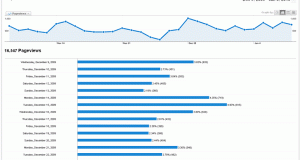Measuring your SEO performance is very difficult today because there is no standard formula for determining success. It’s important to give your clients a measure of success that clearly shows how your progress benefits their business. I always am asked about what metrics to measure and why these are important, and I want to share one that many of your clients miss: organic conversions.
The Obsession with Rankings
If you’ve been in the SEO business for a while, I’m sure you’ve already encountered clients who want to focus on their rankings. They see SERPs placement as the ultimate metric that determines the success of their online marketing efforts, particularly SEO. It may be the earliest and most obvious indicator of your success, but it is not the ultimate determining factor. Focusing on rankings is inadvisable for several reasons:
-
Rankings are very unstable, and they only reflect how well you do SEO, not how well it affects your clients’ businesses;
-
Google is holding information increasingly, with statistics like the number of different keywords bringing in traffic being withheld from users;
-
Rankings only reflect visits, but they do not show how relevant your visitors are;
-
Social search factors affect rankings just as much as link value, and anchor texts are being devalued as algorithms focus more on quality and relevancy
Many clients do not know or realize these reasons. All they know is that they want more visibility, which is good but is not an accurate measure of progress. What you need to look at is the conversion rate that comes from these organic search referrals.
Organic Conversions as the Main KPI
Looking at search conversions as your main KPI gives you a more accurate picture of how your campaign is going. What your clients ultimately want when they look at rankings is to see more customers, and rankings alone won’t show them just how much business your SEO efforts are bringing in. Organic conversions work as your main KPI for several reasons:
-
It is more stable than keyword rankings.Organic conversions are more reliable as a KPI because it is not affected by algorithmic changes, HTML mark-ups, or other online marketing factors that affect keyword rankings. The quality of your page and the way your clients’ products or services affect your conversions: the better your online marketing strategy is, the more customers complete one of your conversion goals.
-
It directly shows how your SEO efforts affect their business.This is especially true for businesses based entirely online. This could be harder to prove for business entities that have other marketing efforts outside of the Internet, but you can still trace leads that converted online and have a working number to begin with. You can track where your goal completions – sign-ups, downloads, purchases, contact, participation in discussions, and other examples – came from and observe the trend as your campaign goes on. Looking at the trend line instead of the numbers gives you a better picture of the progress you are making because it shows you how much relevant traffic you are getting.
-
It gives you a chance to spot opportunities and areas of improvement.Looking at your campaign’s organic conversions allows you to assess your methods better. You can easily pinpoint what methods sell and what methods need improvement. Tracking their conversion process also gives you a good idea of what to emphasize on your client’s website to boost conversions. You can take the elements from those pages that work and apply them to the other pages of your site in order to highlight other products and services that may need further emphasis and attention.
How to Measure and Optimize for Organic Conversions
Measuring search conversions is easier today using Google Analytics. Google may be withdrawing information about keywords specifically, but they still let users track different events and goals on websites. I want to discuss how to use this to track and optimize your organic conversions.
-
Track goals and events on your dashboard.You can create custom goals and add events to your GA dashboard. Add the goals and events you want to track, such as sign-ups, document downloads, purchases, or contact form completion. Once you add these, it’s easy to track conversions based on different factors, such as keywords, traffic source, or landing page.
-
Check your conversion funnel visualization.The funnel visualization effectively shows the steps your target audience takes towards converting (or not converting). You can see where your audience completes conversions, where they exit before completing an action, and where they go to instead. This will help you analyze what works on your site and what needs improvement.
-
Study your reverse goal path.Looking at your reverse goal path shows you two things: it lets you identify methods that work, and it shows you how much organic conversions originate from search. This will serve as your proof to clients that a given number of visits and conversions came from search. It will also help you see what methods work, especially when doing methodology testing.
-
Test using the Experiment tab.Google’s Website Optimizer has been integrated into GA last year. Use this to test your pages and see how you can boost your conversion rates. Using this tool, you can do A/B testing or multivariate testing to determine what version will give the most conversions. Testing gives you a better idea of how your campaign will work and takes the guesswork out of optimization.
We’d be very happy to discuss more about organic conversions and help you analyze the information from your Analytics dashboard. Call your account manager today or log into your account to request a report. Sign up for free if you’re not yet our partner to get your free white label dashboard and to get started. Check back soon for more updates and tips on SEO!



